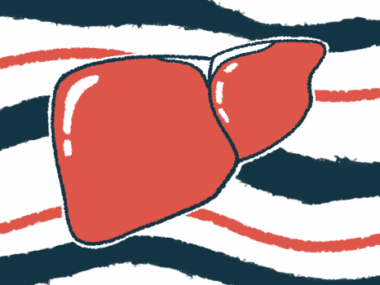FDA approves seladelpar, now Livdelzi, to treat adults with PBC
Gilead small molecule cleared for use as second-line therapy for patients
Written by |

Note: This story was updated Aug. 20, 2024, to correct that Livdelzi is not a first-in-class therapy for primary biliary cholangitis.
The U.S. Food and Drug Administration (FDA) has granted accelerated approval to Gilead Sciences’ oral candidate seladelpar as a second-line therapy for adults with primary biliary cholangitis (PBC).
The newly authorized therapy, available as 10 mg oral capsules that are taken once a day, will be marketed under the brand name Livdelzi with a list price of $12,606 for a 30-day supply. It is indicated for patients without cirrhosis, or permanent liver scarring, or with well-compensated cirrhosis, meaning the liver is still working despite extended liver scarring.
It is cleared for use in combination with the first-line PBC therapy ursodeoxycholic acid (UDCA) in patients who don’t respond to just UDCA, or alone in those unable to tolerate UDCA.
“People living with PBC have been waiting for treatment advancements for many years. Today’s approval of Livdelzi, with its distinct profile, provides them with an important new option,” Daniel O’Day, Gilead’s chairman and CEO, said in a company press release. “We look forward to leveraging Gilead’s long-standing expertise in liver disease to bring this promising new treatment to all those who could benefit.”
Accelerated approval allows an experimental therapy to be approved and marketed based on preliminary efficacy data, with full approval being dependent on further trial data that confirms its effectiveness.
Livdelzi shown in trials to reduce key liver disease marker
The FDA’s decision was based on Livdelzi’s ability to reduce blood levels of alkaline phosphatase (ALP), a liver disease marker that’s linked to a greater risk of death, or of needing a liver transplant.
The ongoing placebo-controlled Phase 3 AFFIRM trial (NCT06051617), which is evaluating Livdelzi’s effects on the clinical outcomes of up to 192 PBC patients with compensated cirrhosis, will be used as a confirmatory study for a potential full approval. That study is still recruiting at sites in the U.S., Turkey, and South Korea.
The regulatory decision comes approximately six months after the agency granted priority review — which shortens the review period to six months from the usual 10 — to the application seeking Livdelzi’s approval. Similar applications seeking the therapy’s approval are now being reviewed by health authorities in the European Union and the U.K.
PBC is an autoimmune disease characterized by chronic cholangitis, or inflammation of the bile ducts. These ducts normally carry bile, a digestive fluid, out of the liver and to the intestines.
In people with PBC, bile duct inflammation disrupts the normal flow of bile. That leads to bile buildup in the liver, causing damage, and allowing bile to leak out into the bloodstream, which causes symptoms such as itching.
The first-line therapy for PBC is UDCA. Sold in the U.S. as Urso and Actigall, it works by speeding the flow of bile from the liver. However, it doesn’t work in all patients, and some individuals experience side effects that stop them from taking UDCA.
A second-line PBC therapy called Ocaliva (obeticholic acid) is used in patients who don’t respond to UDCA, but it can worsen itching in some cases.
Livdelzi is an orally available molecule originally developed by Cymabay Therapeutics, which was acquired by Gilead earlier this year. The therapy is designed to selectively activate PPAR-delta, a protein that helps to regulate the activity of genes involved in bile production, inflammation, and scarring.
As such, Livdelzi is expected to target and slow these PBC-driving processes, ultimately reducing liver damage and lessening itching.
FDA approval welcomed by patient advocacy groups
The applications for the treatment’s approval were mostly based on final data from two placebo-controlled Phase 3 clinical trials — RESPONSE (NCT04620733) and ENHANCE (NCT03602560) — and interim results from the long-term Phase 3 ASSURE study (NCT03301506).
Covering more than 450 adults with PBC who either didn’t respond to UDCA or couldn’t tolerate it, RESPONSE and EHNANCE data showed that up to one year of treatment with Livdelzi was superior to a placebo at reducing liver damage markers and easing patient-reported itching. Consistent benefits were seen for up to two years on the therapy.
The approval was welcomed by patient advocacy groups.
The availability of a new treatment option that can help reduce … intense itching while also improving biomarkers of active liver disease is a milestone for our community.
“Those living with PBC share common symptoms, including incessant itching or skin-crawling sensations, as well as debilitating fatigue that is made worse by the itching at night,” said Carol Roberts, president of The PBCers Organization. “The availability of a new treatment option that can help reduce this intense itching while also improving biomarkers of active liver disease is a milestone for our community.”
The most common adverse events reported with Livdelzi treatment include headache (8%), abdominal pain (7%), nausea (6%), abdominal swelling (6%), and dizziness (5%).
As noted on its label, the therapy is not recommended for PBC patients with decompensated cirrhosis, in which liver function is severely impaired, or for those who develop this condition while on treatment. Signs of decompensated cirrhosis include fluid buildup in the abdomen, bleeding in the gastrointestinal tract, and impaired brain function. The use of Livdelzi should also be avoided by patients with complete bile duct obstruction.
For patients, support will be offered by Gilead. The Gilead Support Path program offers information and resources to help patients who are prescribed Livdelzi understand coverage and financial options.
Gilead has recently paid Johnson & Johnson Innovative Medicine $320 million to exit an 18-year-old licensing agreement with Cymabay on Livdelzi that involved the payment of 8% royalty on future sales of the therapy.








